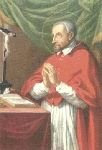St. Robert Bellarmine Short Biography
Cardinal Robert Bellarmine, a Jesuit, and nephew of Pope Marcellus II, who was born in Montepulciano in Tuscany, Italy in 1542, and died in Rome in 1621, was one of the most learned men, and (as is admitted by the Roman catholic party) the most powerful controversialists in defense of the Pope, that the Catholic Church ever produced.
 In 1598 he was made cardinal. On his nomination Clement VIII used these remarkable words: "We choose him because the church of God does not possess his equal in learning." In 1602 he was created archbishop of Capua. Having discharged the duties of this office for about four years, he was recalled to Rome by Paul V, who thought his great talents, learning, and zeal, could be better employed in the councils of the papacy. There he remained until his death. His works are very numerous; most of them written in Latin, in a clear and concise style. His greatest work is his Disputations, or Controversies, concerning the main distinctions between the Rome and Protestant Churches, in four volumes, of which the fourth book in the second volume comprises his famous "Notes of the True Church." His controversial works were not then, and have not since been considered as his own mere opinions, but as authorized vindications of the principles and doctrines of the Pope, spiritual and temporal. They were revised, altered, and corrected in later editions, under the authority of the papal government; and now they stand as the most authentic and genuine record of that twin spiritual and temporal power.
In 1598 he was made cardinal. On his nomination Clement VIII used these remarkable words: "We choose him because the church of God does not possess his equal in learning." In 1602 he was created archbishop of Capua. Having discharged the duties of this office for about four years, he was recalled to Rome by Paul V, who thought his great talents, learning, and zeal, could be better employed in the councils of the papacy. There he remained until his death. His works are very numerous; most of them written in Latin, in a clear and concise style. His greatest work is his Disputations, or Controversies, concerning the main distinctions between the Rome and Protestant Churches, in four volumes, of which the fourth book in the second volume comprises his famous "Notes of the True Church." His controversial works were not then, and have not since been considered as his own mere opinions, but as authorized vindications of the principles and doctrines of the Pope, spiritual and temporal. They were revised, altered, and corrected in later editions, under the authority of the papal government; and now they stand as the most authentic and genuine record of that twin spiritual and temporal power.So much importance was there attached to his works, that for nearly a century there was scarcely an eminent or learned Protestant in Europe who did not publish answers to his ingenious and alluring sophisms. In England his tract on "Notes of the True Church," were considered so important, from the learning of the man that fifteen of the most distinguished ecclesiastics, including one archbishop and six bishops, published formal and elaborate refutations of them, each man taking a separate tract.
Though no writer of the Catholic Church ever showed more zeal, or urged stronger arguments, to prove that the Pope possessed the power of deposing sovereign princes. Yet his "Treatise about the Power of the Pope in Temporal Matters," while it was condemned by the Catholic parliament of Paris, as dangerous to all civil government His work was placed by order of Sixtus V among the condemned books in the catalogue of the Inquisition, because he asserted that the deposing power of the Pope was indirect, and not direct.
Saint Robert Bellarmine On Almost Becoming Pope
His uncle, Marcellus II one day exclaimed in his hearing, "I do not see how those sitting in this high place (the Papal chair) can well be saved." Cardinal Bellarmine, in answer to the question, why so few cardinals were in the catalog of saints, "Because they aspire to be Pope" which means, that the qualities necessary in a saint were at variance with those necessary in a good Pope.




1 comment:
" 'Because they aspire to be Pope' which means, that the qualities necessary in a saint were at variance with those necessary in a good Pope."
But this is not acceptable. As if our Lord created a vocation, a role in the Church which demanded a lack of virtue.
Besides, the canonized popes such as Saint Pius X disprove this: they heroically fulfilled the duties of their state-in-life. The canonization homily given by Pius XII shows that Pius X was not just a holy man; he was a holy pope.
Post a Comment